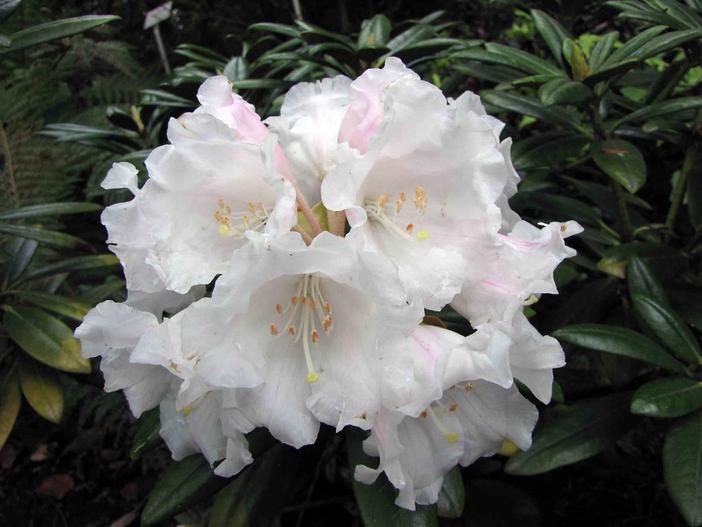Yak Rhododendron
(Rhododendron yakushimanum)
Yak Rhododendron (Rhododendron yakushimanum)
/
/

阿橋花譜 HQ Flower Guide
CC BY-SA 2.0
Image By:
阿橋花譜 HQ Flower Guide
Recorded By:
Copyright:
CC BY-SA 2.0
Copyright Notice:
Photo by: 阿橋花譜 HQ Flower Guide | License Type: CC BY-SA 2.0 | License URL: https://creativecommons.org/licenses/by-sa/2.0/ | Uploader: 阿橋 KHQ | Publisher: Flickr





















Estimated Native Range
Summary
Rhododendron yakushimanum, commonly known as Yak Rhododendron, is an evergreen shrub native to the alpine regions of Yakushima Island, Japan. It is a compact, slow-growing plant that typically reaches 1.5 meters (4.9 feet) in both height and width. The Yak Rhododendron has a mounded form with large clusters of pink to white flowers that bloom in late spring. The flowers are quite showy, and the foliage is dark green with long, narrow, convex leaves that are distinctively felted with a silvery to cinnamon-brown indumentum on the undersides. This species is particularly noted for its attractive foliage and stunning floral display.
The Yak Rhododendron is valued for its ornamental qualities, including its beautiful flowers and unique foliage. It is often used in woodland gardens, as a specimen plant, or in shrub borders. It requires rich, acidic soils to thrive and benefits from a layer of mulch to maintain soil moisture. While it prefers full sun to part shade, it should be protected from harsh afternoon sun in warmer climates. Adequate water is necessary, but the soil must provide good drainage to prevent root rot. This rhododendron is relatively low maintenance but can be susceptible to pests such as vine weevils and diseases like root rot if conditions are not ideal. It is also important to note that all parts of Rhododendron yakushimanum are toxic if ingested.CC BY-SA 4.0
The Yak Rhododendron is valued for its ornamental qualities, including its beautiful flowers and unique foliage. It is often used in woodland gardens, as a specimen plant, or in shrub borders. It requires rich, acidic soils to thrive and benefits from a layer of mulch to maintain soil moisture. While it prefers full sun to part shade, it should be protected from harsh afternoon sun in warmer climates. Adequate water is necessary, but the soil must provide good drainage to prevent root rot. This rhododendron is relatively low maintenance but can be susceptible to pests such as vine weevils and diseases like root rot if conditions are not ideal. It is also important to note that all parts of Rhododendron yakushimanum are toxic if ingested.CC BY-SA 4.0
Plant Description
- Plant Type: Shrub
- Height: 1.5-3 feet
- Width: 1.5-3 feet
- Growth Rate: Moderate
- Flower Color: Pink, White
- Flowering Season: Spring
- Leaf Retention: Evergreen
Growth Requirements
- Sun: Full Sun, Part Shade
- Water: Medium
- Drainage: Medium
Common Uses
Bank Stabilization, Bee Garden, Bird Garden, Border Plant, Butterfly Garden, Deer Resistant, Hedges, Hummingbird Garden, Low Maintenance, Rabbit Resistant, Rock Garden, Salt Tolerant, Showy Flowers, Street Planting
Natural Habitat
Alpine regions of Yakushima Island, Japan
Other Names
Common Names:
Scientific Names: , Rhododendron yakushimanum, Rhododendron degronianum subsp. yakushimanum, Rhododendron metternichii subsp. yakushimanum, Rhododendron metternichii var. yakushimanum, Rhododendron degronianum var. yakushimanum,
GBIF Accepted Name: Rhododendron yakushimanum Nakai